UZTY5X-20-2: Mentorship Portfolio - Facilitating Learning & Assessment
VerifiedAdded on 2023/04/22
|31
|6511
|428
Portfolio
AI Summary
This mentorship portfolio proforma documents a clinical nurse's journey in facilitating learning and assessment in practice. It includes sections on personal and professional development, development of learning and teaching, facilitation of learning, assessment and feedback, and reflection. The portfolio aims to provide evidence of meeting the learning outcomes for the 'Facilitating learning and assessment in practice' module. The student identifies their learning needs through self-assessment and incident analysis, formulates a learning contract, and explores different teaching strategies. The portfolio also covers the creation of a supportive learning environment and the evaluation of learning experiences. The reflection section evaluates teaching sessions using a reflective framework.
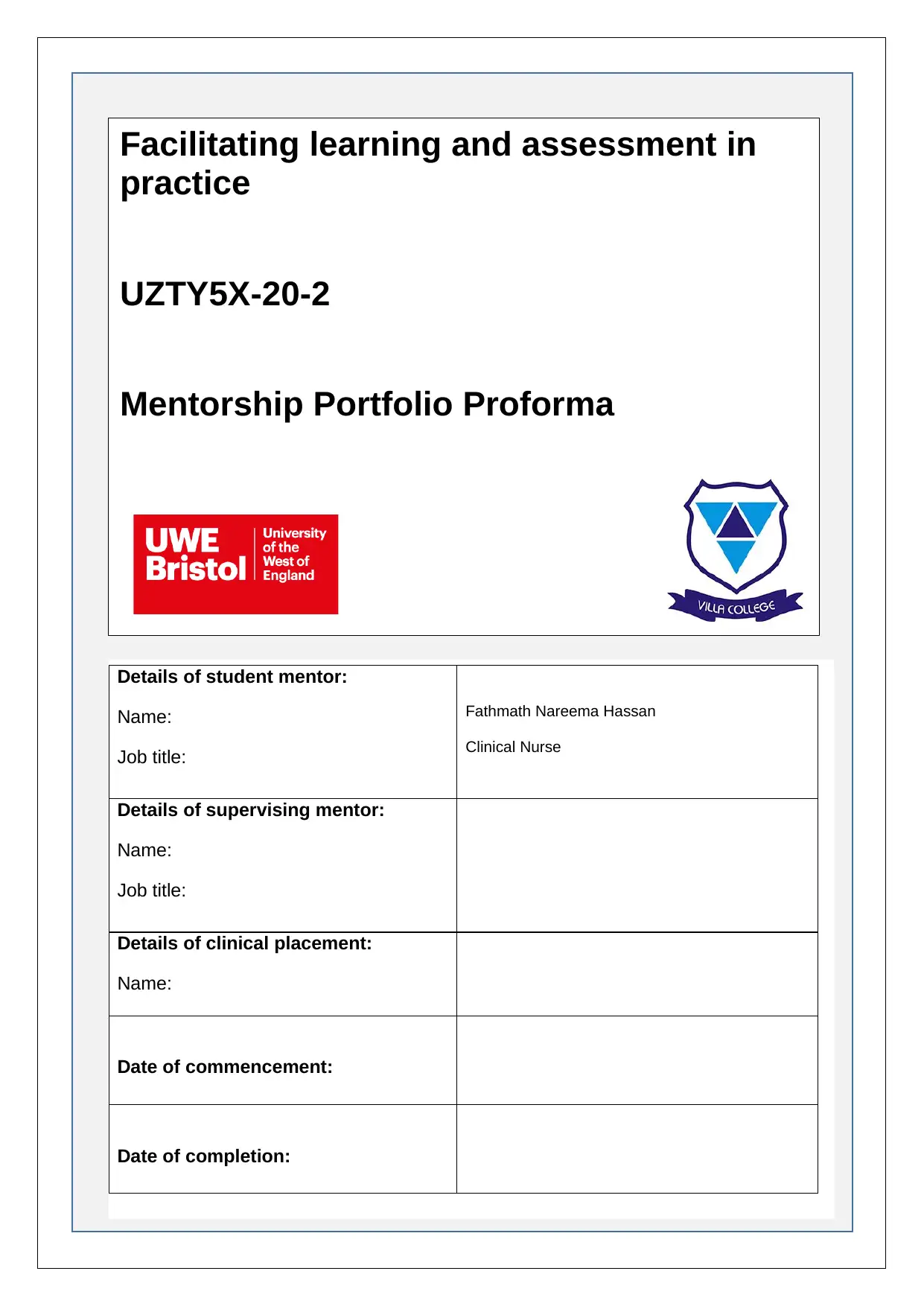
Facilitating learning and assessment in
practice
UZTY5X-20-2
Mentorship Portfolio Proforma
Details of student mentor:
Name:
Job title:
Fathmath Nareema Hassan
Clinical Nurse
Details of supervising mentor:
Name:
Job title:
Details of clinical placement:
Name:
Date of commencement:
Date of completion:
practice
UZTY5X-20-2
Mentorship Portfolio Proforma
Details of student mentor:
Name:
Job title:
Fathmath Nareema Hassan
Clinical Nurse
Details of supervising mentor:
Name:
Job title:
Details of clinical placement:
Name:
Date of commencement:
Date of completion:
Paraphrase This Document
Need a fresh take? Get an instant paraphrase of this document with our AI Paraphraser
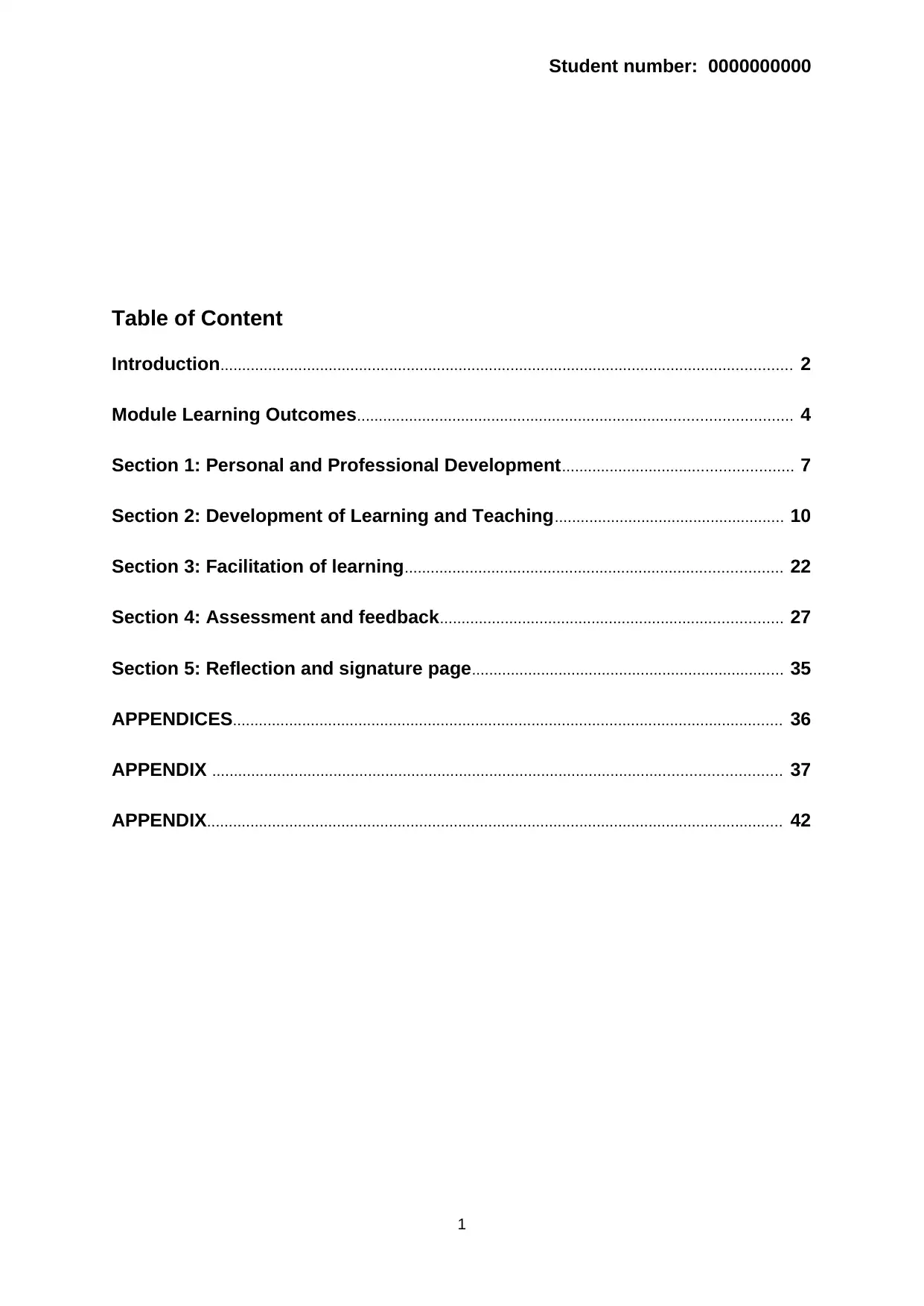
Student number: 0000000000
Table of Content
Introduction.................................................................................................................................... 2
Module Learning Outcomes.................................................................................................... 4
Section 1: Personal and Professional Development..................................................... 7
Section 2: Development of Learning and Teaching..................................................... 10
Section 3: Facilitation of learning....................................................................................... 22
Section 4: Assessment and feedback............................................................................... 27
Section 5: Reflection and signature page........................................................................ 35
APPENDICES............................................................................................................................... 36
APPENDIX ................................................................................................................................... 37
APPENDIX..................................................................................................................................... 42
1
Table of Content
Introduction.................................................................................................................................... 2
Module Learning Outcomes.................................................................................................... 4
Section 1: Personal and Professional Development..................................................... 7
Section 2: Development of Learning and Teaching..................................................... 10
Section 3: Facilitation of learning....................................................................................... 22
Section 4: Assessment and feedback............................................................................... 27
Section 5: Reflection and signature page........................................................................ 35
APPENDICES............................................................................................................................... 36
APPENDIX ................................................................................................................................... 37
APPENDIX..................................................................................................................................... 42
1
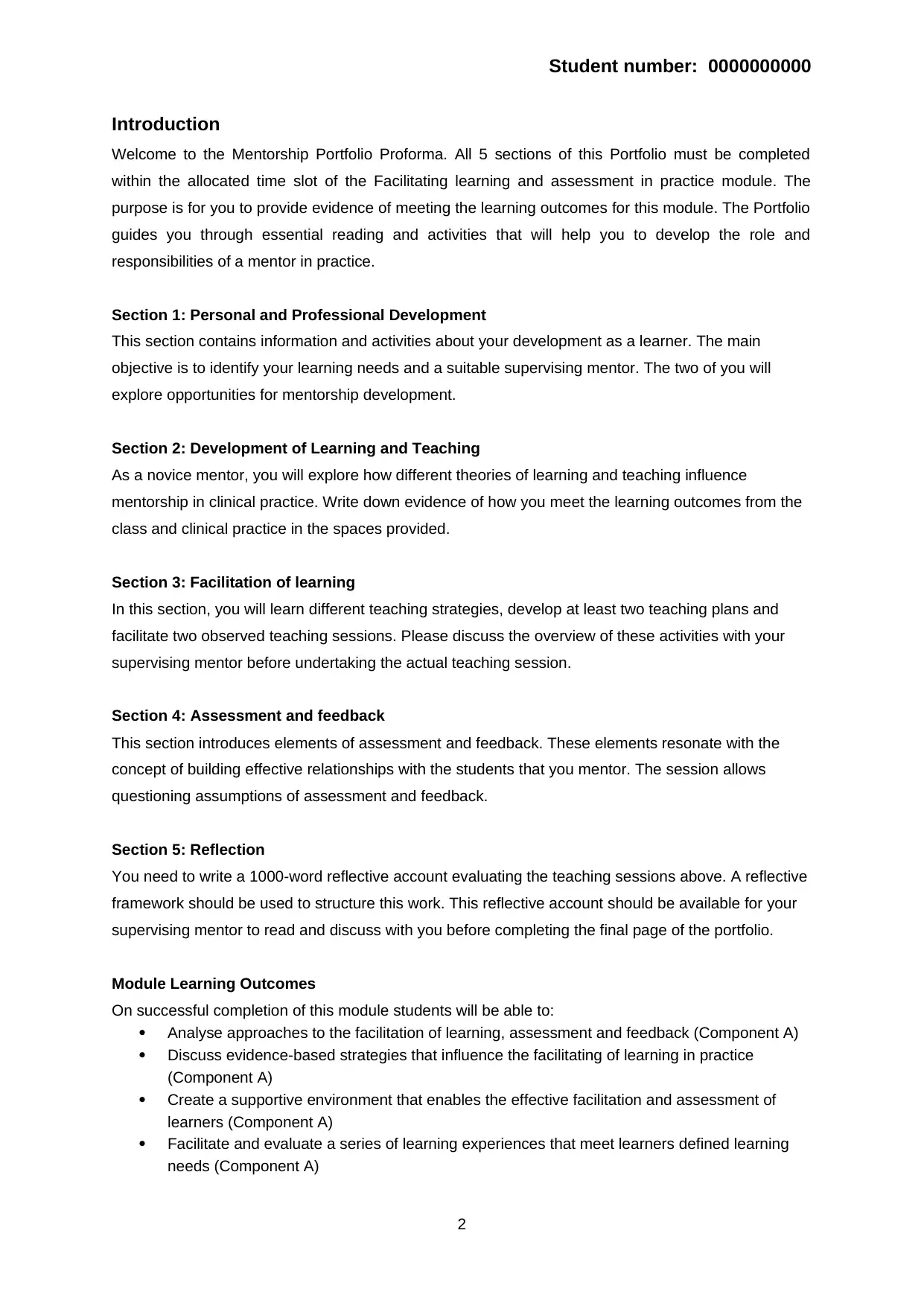
Student number: 0000000000
Introduction
Welcome to the Mentorship Portfolio Proforma. All 5 sections of this Portfolio must be completed
within the allocated time slot of the Facilitating learning and assessment in practice module. The
purpose is for you to provide evidence of meeting the learning outcomes for this module. The Portfolio
guides you through essential reading and activities that will help you to develop the role and
responsibilities of a mentor in practice.
Section 1: Personal and Professional Development
This section contains information and activities about your development as a learner. The main
objective is to identify your learning needs and a suitable supervising mentor. The two of you will
explore opportunities for mentorship development.
Section 2: Development of Learning and Teaching
As a novice mentor, you will explore how different theories of learning and teaching influence
mentorship in clinical practice. Write down evidence of how you meet the learning outcomes from the
class and clinical practice in the spaces provided.
Section 3: Facilitation of learning
In this section, you will learn different teaching strategies, develop at least two teaching plans and
facilitate two observed teaching sessions. Please discuss the overview of these activities with your
supervising mentor before undertaking the actual teaching session.
Section 4: Assessment and feedback
This section introduces elements of assessment and feedback. These elements resonate with the
concept of building effective relationships with the students that you mentor. The session allows
questioning assumptions of assessment and feedback.
Section 5: Reflection
You need to write a 1000-word reflective account evaluating the teaching sessions above. A reflective
framework should be used to structure this work. This reflective account should be available for your
supervising mentor to read and discuss with you before completing the final page of the portfolio.
Module Learning Outcomes
On successful completion of this module students will be able to:
Analyse approaches to the facilitation of learning, assessment and feedback (Component A)
Discuss evidence-based strategies that influence the facilitating of learning in practice
(Component A)
Create a supportive environment that enables the effective facilitation and assessment of
learners (Component A)
Facilitate and evaluate a series of learning experiences that meet learners defined learning
needs (Component A)
2
Introduction
Welcome to the Mentorship Portfolio Proforma. All 5 sections of this Portfolio must be completed
within the allocated time slot of the Facilitating learning and assessment in practice module. The
purpose is for you to provide evidence of meeting the learning outcomes for this module. The Portfolio
guides you through essential reading and activities that will help you to develop the role and
responsibilities of a mentor in practice.
Section 1: Personal and Professional Development
This section contains information and activities about your development as a learner. The main
objective is to identify your learning needs and a suitable supervising mentor. The two of you will
explore opportunities for mentorship development.
Section 2: Development of Learning and Teaching
As a novice mentor, you will explore how different theories of learning and teaching influence
mentorship in clinical practice. Write down evidence of how you meet the learning outcomes from the
class and clinical practice in the spaces provided.
Section 3: Facilitation of learning
In this section, you will learn different teaching strategies, develop at least two teaching plans and
facilitate two observed teaching sessions. Please discuss the overview of these activities with your
supervising mentor before undertaking the actual teaching session.
Section 4: Assessment and feedback
This section introduces elements of assessment and feedback. These elements resonate with the
concept of building effective relationships with the students that you mentor. The session allows
questioning assumptions of assessment and feedback.
Section 5: Reflection
You need to write a 1000-word reflective account evaluating the teaching sessions above. A reflective
framework should be used to structure this work. This reflective account should be available for your
supervising mentor to read and discuss with you before completing the final page of the portfolio.
Module Learning Outcomes
On successful completion of this module students will be able to:
Analyse approaches to the facilitation of learning, assessment and feedback (Component A)
Discuss evidence-based strategies that influence the facilitating of learning in practice
(Component A)
Create a supportive environment that enables the effective facilitation and assessment of
learners (Component A)
Facilitate and evaluate a series of learning experiences that meet learners defined learning
needs (Component A)
2
⊘ This is a preview!⊘
Do you want full access?
Subscribe today to unlock all pages.

Trusted by 1+ million students worldwide
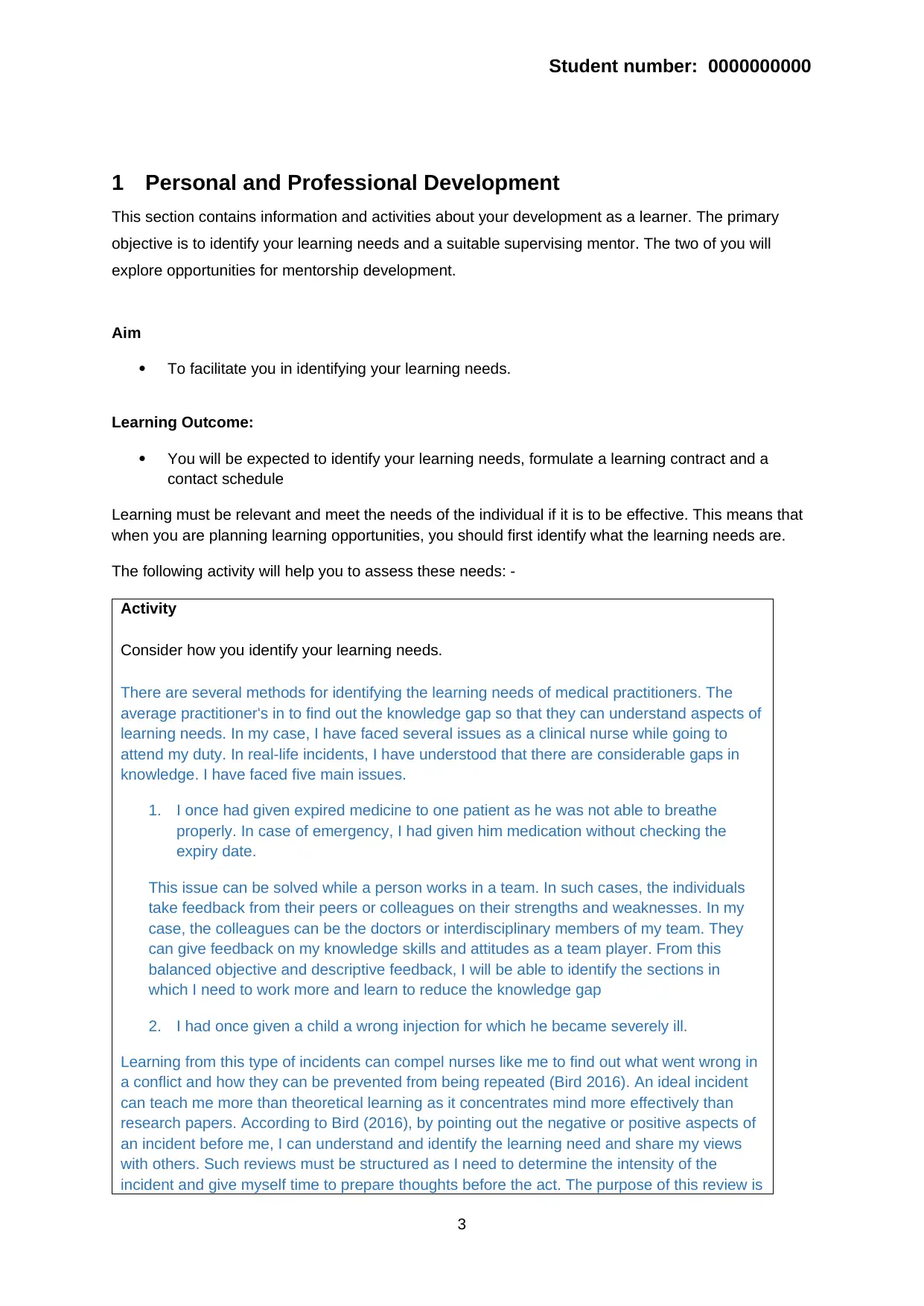
Student number: 0000000000
1 Personal and Professional Development
This section contains information and activities about your development as a learner. The primary
objective is to identify your learning needs and a suitable supervising mentor. The two of you will
explore opportunities for mentorship development.
Aim
To facilitate you in identifying your learning needs.
Learning Outcome:
You will be expected to identify your learning needs, formulate a learning contract and a
contact schedule
Learning must be relevant and meet the needs of the individual if it is to be effective. This means that
when you are planning learning opportunities, you should first identify what the learning needs are.
The following activity will help you to assess these needs: -
Activity
Consider how you identify your learning needs.
There are several methods for identifying the learning needs of medical practitioners. The
average practitioner's in to find out the knowledge gap so that they can understand aspects of
learning needs. In my case, I have faced several issues as a clinical nurse while going to
attend my duty. In real-life incidents, I have understood that there are considerable gaps in
knowledge. I have faced five main issues.
1. I once had given expired medicine to one patient as he was not able to breathe
properly. In case of emergency, I had given him medication without checking the
expiry date.
This issue can be solved while a person works in a team. In such cases, the individuals
take feedback from their peers or colleagues on their strengths and weaknesses. In my
case, the colleagues can be the doctors or interdisciplinary members of my team. They
can give feedback on my knowledge skills and attitudes as a team player. From this
balanced objective and descriptive feedback, I will be able to identify the sections in
which I need to work more and learn to reduce the knowledge gap
2. I had once given a child a wrong injection for which he became severely ill.
Learning from this type of incidents can compel nurses like me to find out what went wrong in
a conflict and how they can be prevented from being repeated (Bird 2016). An ideal incident
can teach me more than theoretical learning as it concentrates mind more effectively than
research papers. According to Bird (2016), by pointing out the negative or positive aspects of
an incident before me, I can understand and identify the learning need and share my views
with others. Such reviews must be structured as I need to determine the intensity of the
incident and give myself time to prepare thoughts before the act. The purpose of this review is
3
1 Personal and Professional Development
This section contains information and activities about your development as a learner. The primary
objective is to identify your learning needs and a suitable supervising mentor. The two of you will
explore opportunities for mentorship development.
Aim
To facilitate you in identifying your learning needs.
Learning Outcome:
You will be expected to identify your learning needs, formulate a learning contract and a
contact schedule
Learning must be relevant and meet the needs of the individual if it is to be effective. This means that
when you are planning learning opportunities, you should first identify what the learning needs are.
The following activity will help you to assess these needs: -
Activity
Consider how you identify your learning needs.
There are several methods for identifying the learning needs of medical practitioners. The
average practitioner's in to find out the knowledge gap so that they can understand aspects of
learning needs. In my case, I have faced several issues as a clinical nurse while going to
attend my duty. In real-life incidents, I have understood that there are considerable gaps in
knowledge. I have faced five main issues.
1. I once had given expired medicine to one patient as he was not able to breathe
properly. In case of emergency, I had given him medication without checking the
expiry date.
This issue can be solved while a person works in a team. In such cases, the individuals
take feedback from their peers or colleagues on their strengths and weaknesses. In my
case, the colleagues can be the doctors or interdisciplinary members of my team. They
can give feedback on my knowledge skills and attitudes as a team player. From this
balanced objective and descriptive feedback, I will be able to identify the sections in
which I need to work more and learn to reduce the knowledge gap
2. I had once given a child a wrong injection for which he became severely ill.
Learning from this type of incidents can compel nurses like me to find out what went wrong in
a conflict and how they can be prevented from being repeated (Bird 2016). An ideal incident
can teach me more than theoretical learning as it concentrates mind more effectively than
research papers. According to Bird (2016), by pointing out the negative or positive aspects of
an incident before me, I can understand and identify the learning need and share my views
with others. Such reviews must be structured as I need to determine the intensity of the
incident and give myself time to prepare thoughts before the act. The purpose of this review is
3
Paraphrase This Document
Need a fresh take? Get an instant paraphrase of this document with our AI Paraphraser
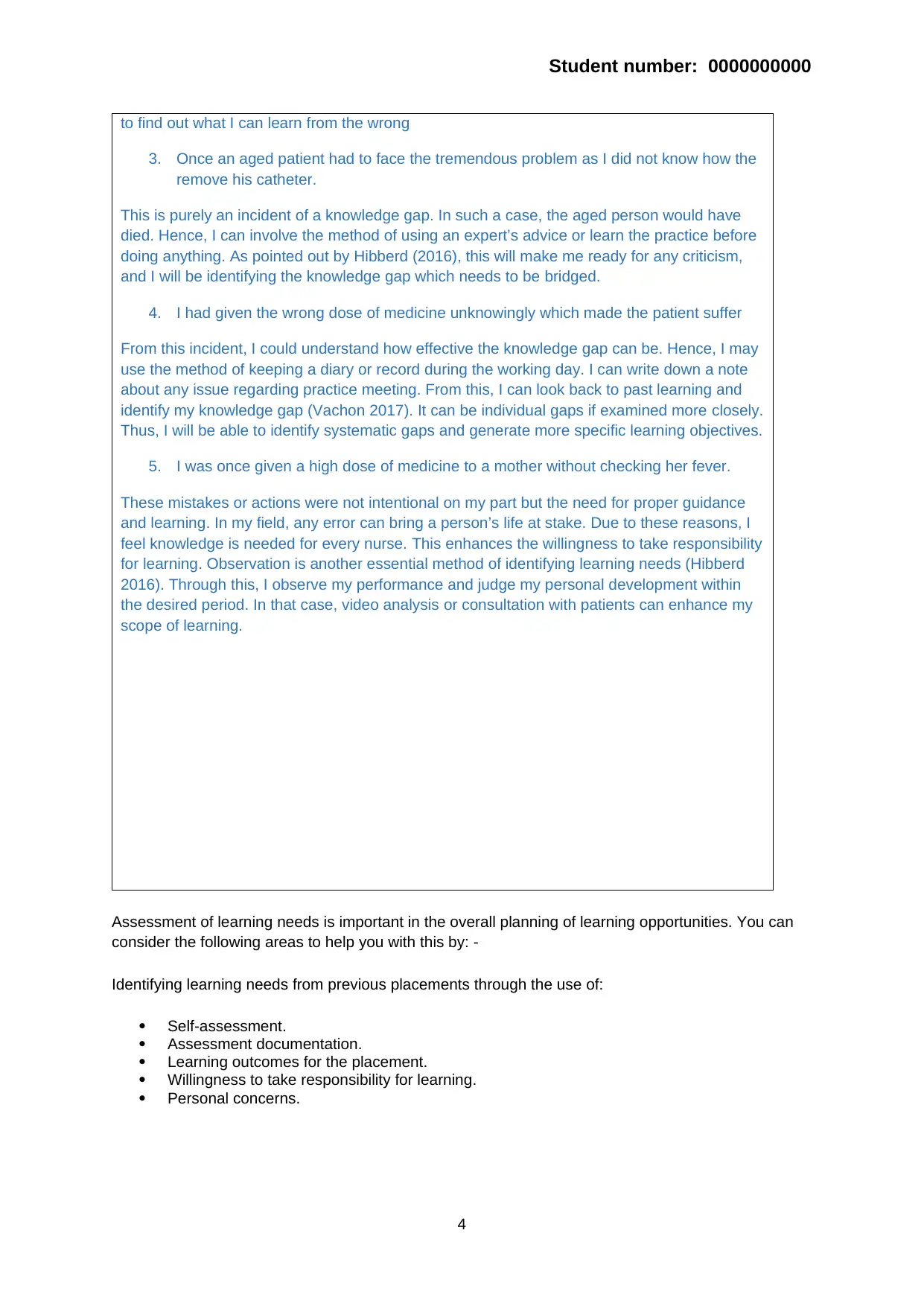
Student number: 0000000000
to find out what I can learn from the wrong
3. Once an aged patient had to face the tremendous problem as I did not know how the
remove his catheter.
This is purely an incident of a knowledge gap. In such a case, the aged person would have
died. Hence, I can involve the method of using an expert’s advice or learn the practice before
doing anything. As pointed out by Hibberd (2016), this will make me ready for any criticism,
and I will be identifying the knowledge gap which needs to be bridged.
4. I had given the wrong dose of medicine unknowingly which made the patient suffer
From this incident, I could understand how effective the knowledge gap can be. Hence, I may
use the method of keeping a diary or record during the working day. I can write down a note
about any issue regarding practice meeting. From this, I can look back to past learning and
identify my knowledge gap (Vachon 2017). It can be individual gaps if examined more closely.
Thus, I will be able to identify systematic gaps and generate more specific learning objectives.
5. I was once given a high dose of medicine to a mother without checking her fever.
These mistakes or actions were not intentional on my part but the need for proper guidance
and learning. In my field, any error can bring a person’s life at stake. Due to these reasons, I
feel knowledge is needed for every nurse. This enhances the willingness to take responsibility
for learning. Observation is another essential method of identifying learning needs (Hibberd
2016). Through this, I observe my performance and judge my personal development within
the desired period. In that case, video analysis or consultation with patients can enhance my
scope of learning.
Assessment of learning needs is important in the overall planning of learning opportunities. You can
consider the following areas to help you with this by: -
Identifying learning needs from previous placements through the use of:
Self-assessment.
Assessment documentation.
Learning outcomes for the placement.
Willingness to take responsibility for learning.
Personal concerns.
4
to find out what I can learn from the wrong
3. Once an aged patient had to face the tremendous problem as I did not know how the
remove his catheter.
This is purely an incident of a knowledge gap. In such a case, the aged person would have
died. Hence, I can involve the method of using an expert’s advice or learn the practice before
doing anything. As pointed out by Hibberd (2016), this will make me ready for any criticism,
and I will be identifying the knowledge gap which needs to be bridged.
4. I had given the wrong dose of medicine unknowingly which made the patient suffer
From this incident, I could understand how effective the knowledge gap can be. Hence, I may
use the method of keeping a diary or record during the working day. I can write down a note
about any issue regarding practice meeting. From this, I can look back to past learning and
identify my knowledge gap (Vachon 2017). It can be individual gaps if examined more closely.
Thus, I will be able to identify systematic gaps and generate more specific learning objectives.
5. I was once given a high dose of medicine to a mother without checking her fever.
These mistakes or actions were not intentional on my part but the need for proper guidance
and learning. In my field, any error can bring a person’s life at stake. Due to these reasons, I
feel knowledge is needed for every nurse. This enhances the willingness to take responsibility
for learning. Observation is another essential method of identifying learning needs (Hibberd
2016). Through this, I observe my performance and judge my personal development within
the desired period. In that case, video analysis or consultation with patients can enhance my
scope of learning.
Assessment of learning needs is important in the overall planning of learning opportunities. You can
consider the following areas to help you with this by: -
Identifying learning needs from previous placements through the use of:
Self-assessment.
Assessment documentation.
Learning outcomes for the placement.
Willingness to take responsibility for learning.
Personal concerns.
4
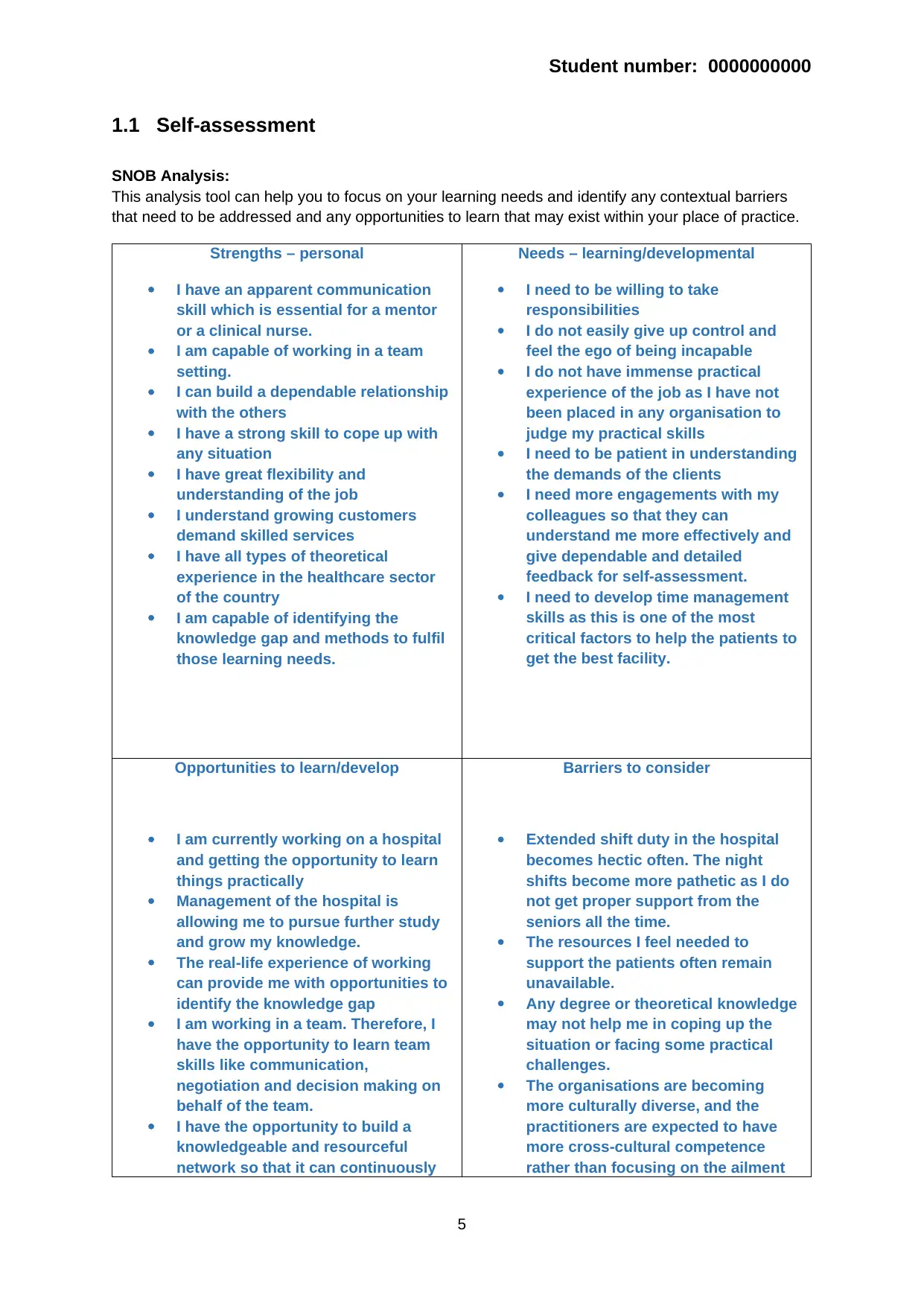
Student number: 0000000000
1.1 Self-assessment
SNOB Analysis:
This analysis tool can help you to focus on your learning needs and identify any contextual barriers
that need to be addressed and any opportunities to learn that may exist within your place of practice.
Strengths – personal
I have an apparent communication
skill which is essential for a mentor
or a clinical nurse.
I am capable of working in a team
setting.
I can build a dependable relationship
with the others
I have a strong skill to cope up with
any situation
I have great flexibility and
understanding of the job
I understand growing customers
demand skilled services
I have all types of theoretical
experience in the healthcare sector
of the country
I am capable of identifying the
knowledge gap and methods to fulfil
those learning needs.
Needs – learning/developmental
I need to be willing to take
responsibilities
I do not easily give up control and
feel the ego of being incapable
I do not have immense practical
experience of the job as I have not
been placed in any organisation to
judge my practical skills
I need to be patient in understanding
the demands of the clients
I need more engagements with my
colleagues so that they can
understand me more effectively and
give dependable and detailed
feedback for self-assessment.
I need to develop time management
skills as this is one of the most
critical factors to help the patients to
get the best facility.
Opportunities to learn/develop
I am currently working on a hospital
and getting the opportunity to learn
things practically
Management of the hospital is
allowing me to pursue further study
and grow my knowledge.
The real-life experience of working
can provide me with opportunities to
identify the knowledge gap
I am working in a team. Therefore, I
have the opportunity to learn team
skills like communication,
negotiation and decision making on
behalf of the team.
I have the opportunity to build a
knowledgeable and resourceful
network so that it can continuously
Barriers to consider
Extended shift duty in the hospital
becomes hectic often. The night
shifts become more pathetic as I do
not get proper support from the
seniors all the time.
The resources I feel needed to
support the patients often remain
unavailable.
Any degree or theoretical knowledge
may not help me in coping up the
situation or facing some practical
challenges.
The organisations are becoming
more culturally diverse, and the
practitioners are expected to have
more cross-cultural competence
rather than focusing on the ailment
5
1.1 Self-assessment
SNOB Analysis:
This analysis tool can help you to focus on your learning needs and identify any contextual barriers
that need to be addressed and any opportunities to learn that may exist within your place of practice.
Strengths – personal
I have an apparent communication
skill which is essential for a mentor
or a clinical nurse.
I am capable of working in a team
setting.
I can build a dependable relationship
with the others
I have a strong skill to cope up with
any situation
I have great flexibility and
understanding of the job
I understand growing customers
demand skilled services
I have all types of theoretical
experience in the healthcare sector
of the country
I am capable of identifying the
knowledge gap and methods to fulfil
those learning needs.
Needs – learning/developmental
I need to be willing to take
responsibilities
I do not easily give up control and
feel the ego of being incapable
I do not have immense practical
experience of the job as I have not
been placed in any organisation to
judge my practical skills
I need to be patient in understanding
the demands of the clients
I need more engagements with my
colleagues so that they can
understand me more effectively and
give dependable and detailed
feedback for self-assessment.
I need to develop time management
skills as this is one of the most
critical factors to help the patients to
get the best facility.
Opportunities to learn/develop
I am currently working on a hospital
and getting the opportunity to learn
things practically
Management of the hospital is
allowing me to pursue further study
and grow my knowledge.
The real-life experience of working
can provide me with opportunities to
identify the knowledge gap
I am working in a team. Therefore, I
have the opportunity to learn team
skills like communication,
negotiation and decision making on
behalf of the team.
I have the opportunity to build a
knowledgeable and resourceful
network so that it can continuously
Barriers to consider
Extended shift duty in the hospital
becomes hectic often. The night
shifts become more pathetic as I do
not get proper support from the
seniors all the time.
The resources I feel needed to
support the patients often remain
unavailable.
Any degree or theoretical knowledge
may not help me in coping up the
situation or facing some practical
challenges.
The organisations are becoming
more culturally diverse, and the
practitioners are expected to have
more cross-cultural competence
rather than focusing on the ailment
5
⊘ This is a preview!⊘
Do you want full access?
Subscribe today to unlock all pages.

Trusted by 1+ million students worldwide
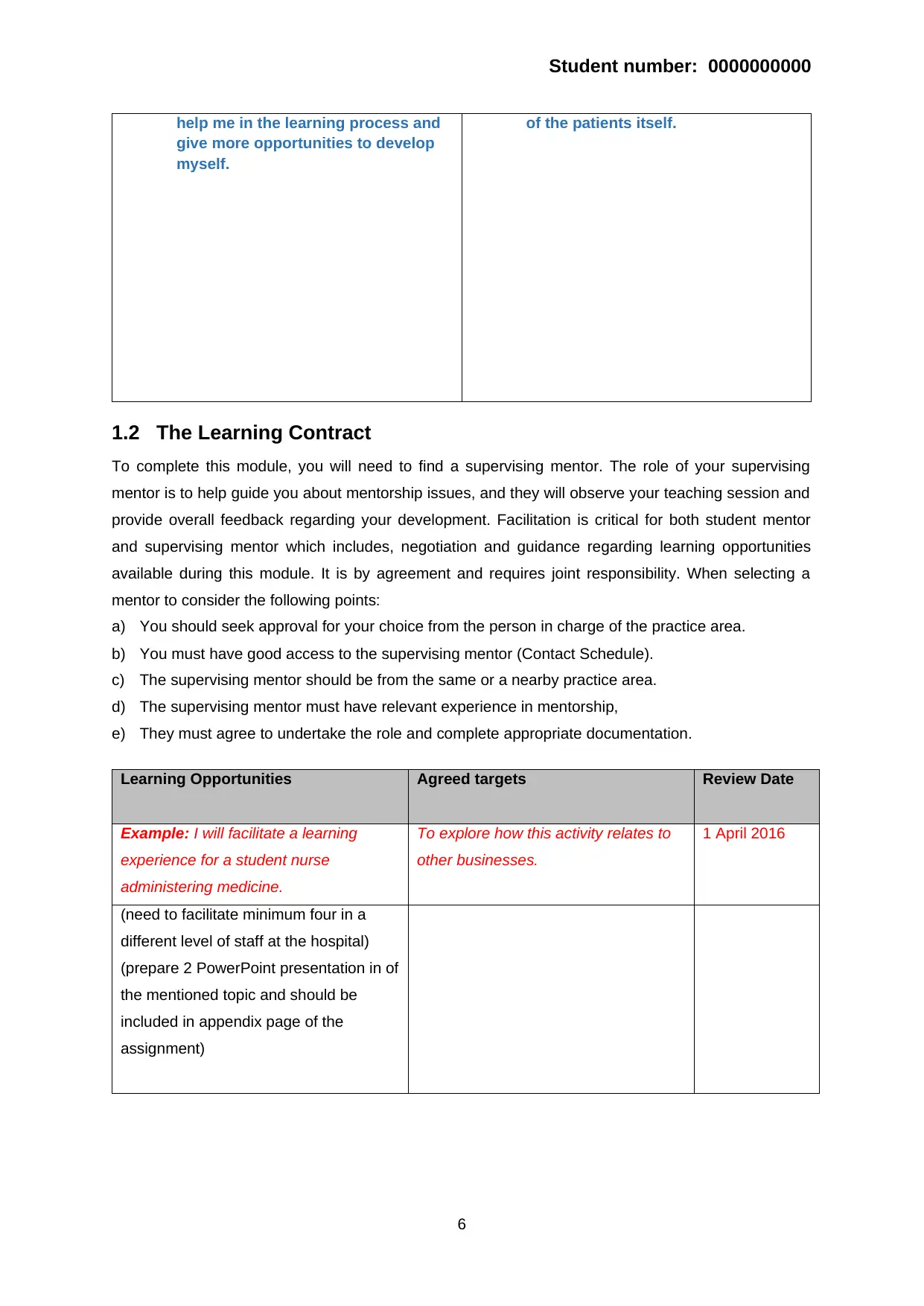
Student number: 0000000000
help me in the learning process and
give more opportunities to develop
myself.
of the patients itself.
1.2 The Learning Contract
To complete this module, you will need to find a supervising mentor. The role of your supervising
mentor is to help guide you about mentorship issues, and they will observe your teaching session and
provide overall feedback regarding your development. Facilitation is critical for both student mentor
and supervising mentor which includes, negotiation and guidance regarding learning opportunities
available during this module. It is by agreement and requires joint responsibility. When selecting a
mentor to consider the following points:
a) You should seek approval for your choice from the person in charge of the practice area.
b) You must have good access to the supervising mentor (Contact Schedule).
c) The supervising mentor should be from the same or a nearby practice area.
d) The supervising mentor must have relevant experience in mentorship,
e) They must agree to undertake the role and complete appropriate documentation.
Learning Opportunities Agreed targets Review Date
Example: I will facilitate a learning
experience for a student nurse
administering medicine.
To explore how this activity relates to
other businesses.
1 April 2016
(need to facilitate minimum four in a
different level of staff at the hospital)
(prepare 2 PowerPoint presentation in of
the mentioned topic and should be
included in appendix page of the
assignment)
6
help me in the learning process and
give more opportunities to develop
myself.
of the patients itself.
1.2 The Learning Contract
To complete this module, you will need to find a supervising mentor. The role of your supervising
mentor is to help guide you about mentorship issues, and they will observe your teaching session and
provide overall feedback regarding your development. Facilitation is critical for both student mentor
and supervising mentor which includes, negotiation and guidance regarding learning opportunities
available during this module. It is by agreement and requires joint responsibility. When selecting a
mentor to consider the following points:
a) You should seek approval for your choice from the person in charge of the practice area.
b) You must have good access to the supervising mentor (Contact Schedule).
c) The supervising mentor should be from the same or a nearby practice area.
d) The supervising mentor must have relevant experience in mentorship,
e) They must agree to undertake the role and complete appropriate documentation.
Learning Opportunities Agreed targets Review Date
Example: I will facilitate a learning
experience for a student nurse
administering medicine.
To explore how this activity relates to
other businesses.
1 April 2016
(need to facilitate minimum four in a
different level of staff at the hospital)
(prepare 2 PowerPoint presentation in of
the mentioned topic and should be
included in appendix page of the
assignment)
6
Paraphrase This Document
Need a fresh take? Get an instant paraphrase of this document with our AI Paraphraser
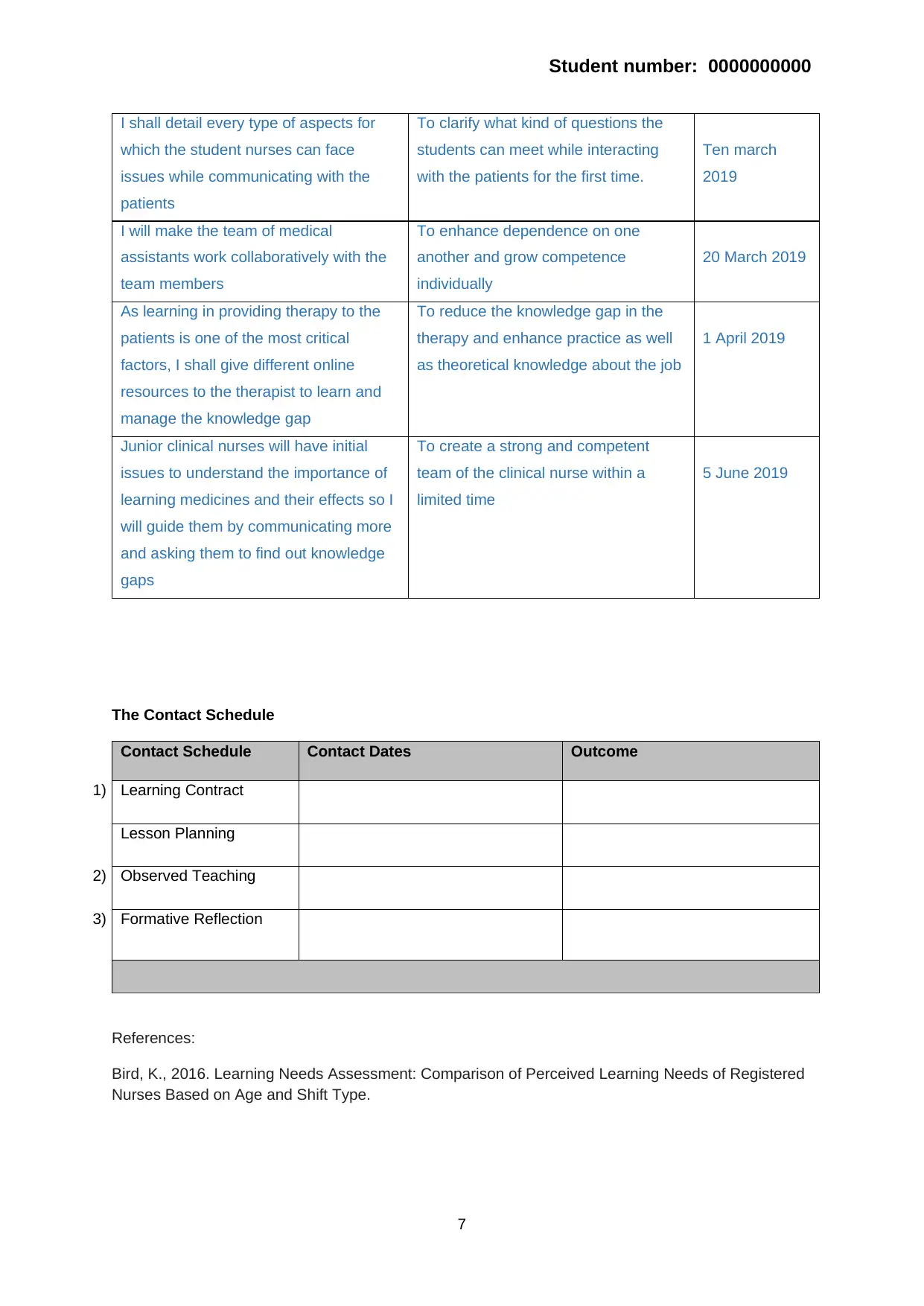
Student number: 0000000000
I shall detail every type of aspects for
which the student nurses can face
issues while communicating with the
patients
To clarify what kind of questions the
students can meet while interacting
with the patients for the first time.
Ten march
2019
I will make the team of medical
assistants work collaboratively with the
team members
To enhance dependence on one
another and grow competence
individually
20 March 2019
As learning in providing therapy to the
patients is one of the most critical
factors, I shall give different online
resources to the therapist to learn and
manage the knowledge gap
To reduce the knowledge gap in the
therapy and enhance practice as well
as theoretical knowledge about the job
1 April 2019
Junior clinical nurses will have initial
issues to understand the importance of
learning medicines and their effects so I
will guide them by communicating more
and asking them to find out knowledge
gaps
To create a strong and competent
team of the clinical nurse within a
limited time
5 June 2019
The Contact Schedule
Contact Schedule Contact Dates Outcome
1) Learning Contract
Lesson Planning
2) Observed Teaching
3) Formative Reflection
References:
Bird, K., 2016. Learning Needs Assessment: Comparison of Perceived Learning Needs of Registered
Nurses Based on Age and Shift Type.
7
I shall detail every type of aspects for
which the student nurses can face
issues while communicating with the
patients
To clarify what kind of questions the
students can meet while interacting
with the patients for the first time.
Ten march
2019
I will make the team of medical
assistants work collaboratively with the
team members
To enhance dependence on one
another and grow competence
individually
20 March 2019
As learning in providing therapy to the
patients is one of the most critical
factors, I shall give different online
resources to the therapist to learn and
manage the knowledge gap
To reduce the knowledge gap in the
therapy and enhance practice as well
as theoretical knowledge about the job
1 April 2019
Junior clinical nurses will have initial
issues to understand the importance of
learning medicines and their effects so I
will guide them by communicating more
and asking them to find out knowledge
gaps
To create a strong and competent
team of the clinical nurse within a
limited time
5 June 2019
The Contact Schedule
Contact Schedule Contact Dates Outcome
1) Learning Contract
Lesson Planning
2) Observed Teaching
3) Formative Reflection
References:
Bird, K., 2016. Learning Needs Assessment: Comparison of Perceived Learning Needs of Registered
Nurses Based on Age and Shift Type.
7
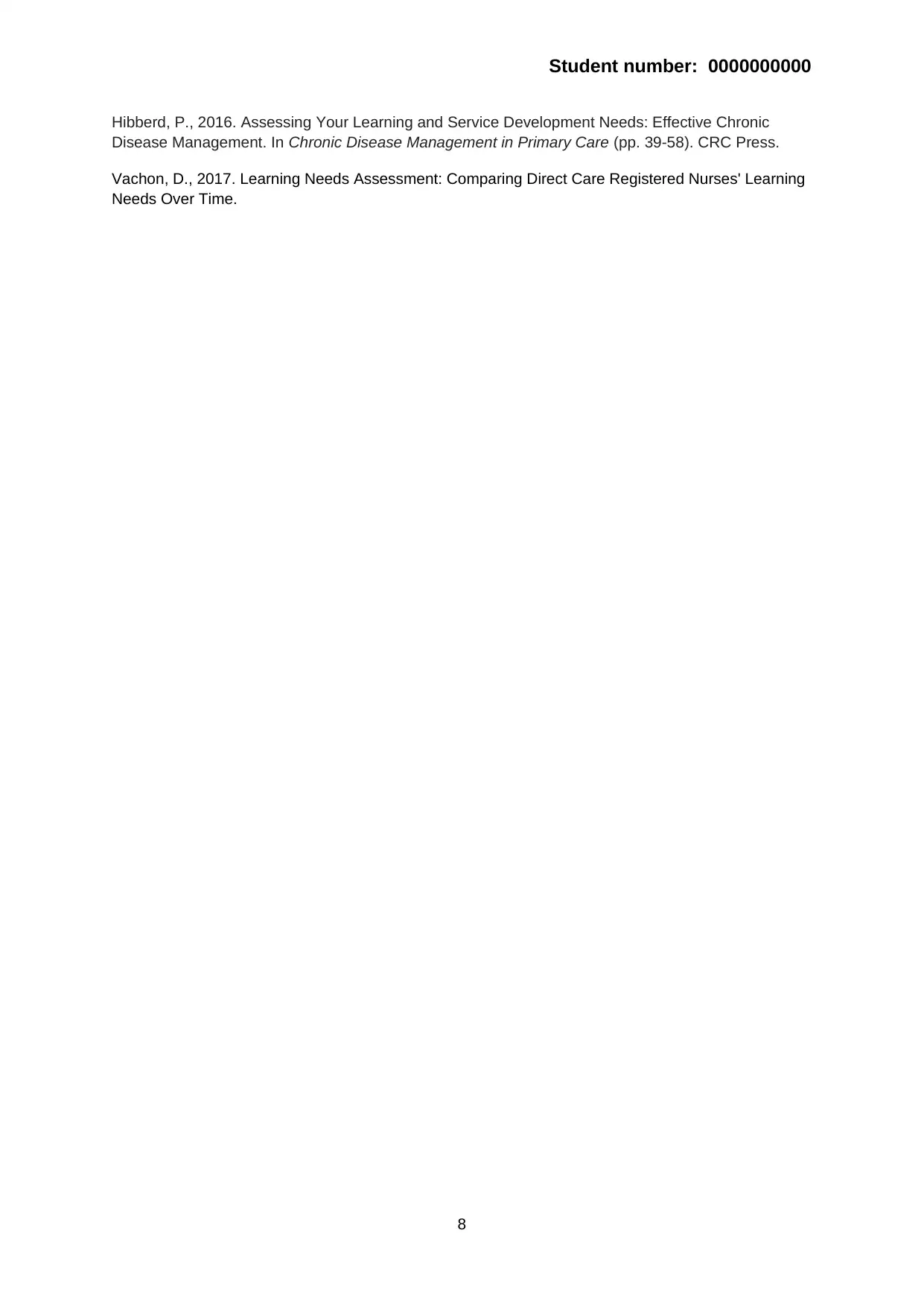
Student number: 0000000000
Hibberd, P., 2016. Assessing Your Learning and Service Development Needs: Effective Chronic
Disease Management. In Chronic Disease Management in Primary Care (pp. 39-58). CRC Press.
Vachon, D., 2017. Learning Needs Assessment: Comparing Direct Care Registered Nurses' Learning
Needs Over Time.
8
Hibberd, P., 2016. Assessing Your Learning and Service Development Needs: Effective Chronic
Disease Management. In Chronic Disease Management in Primary Care (pp. 39-58). CRC Press.
Vachon, D., 2017. Learning Needs Assessment: Comparing Direct Care Registered Nurses' Learning
Needs Over Time.
8
⊘ This is a preview!⊘
Do you want full access?
Subscribe today to unlock all pages.

Trusted by 1+ million students worldwide
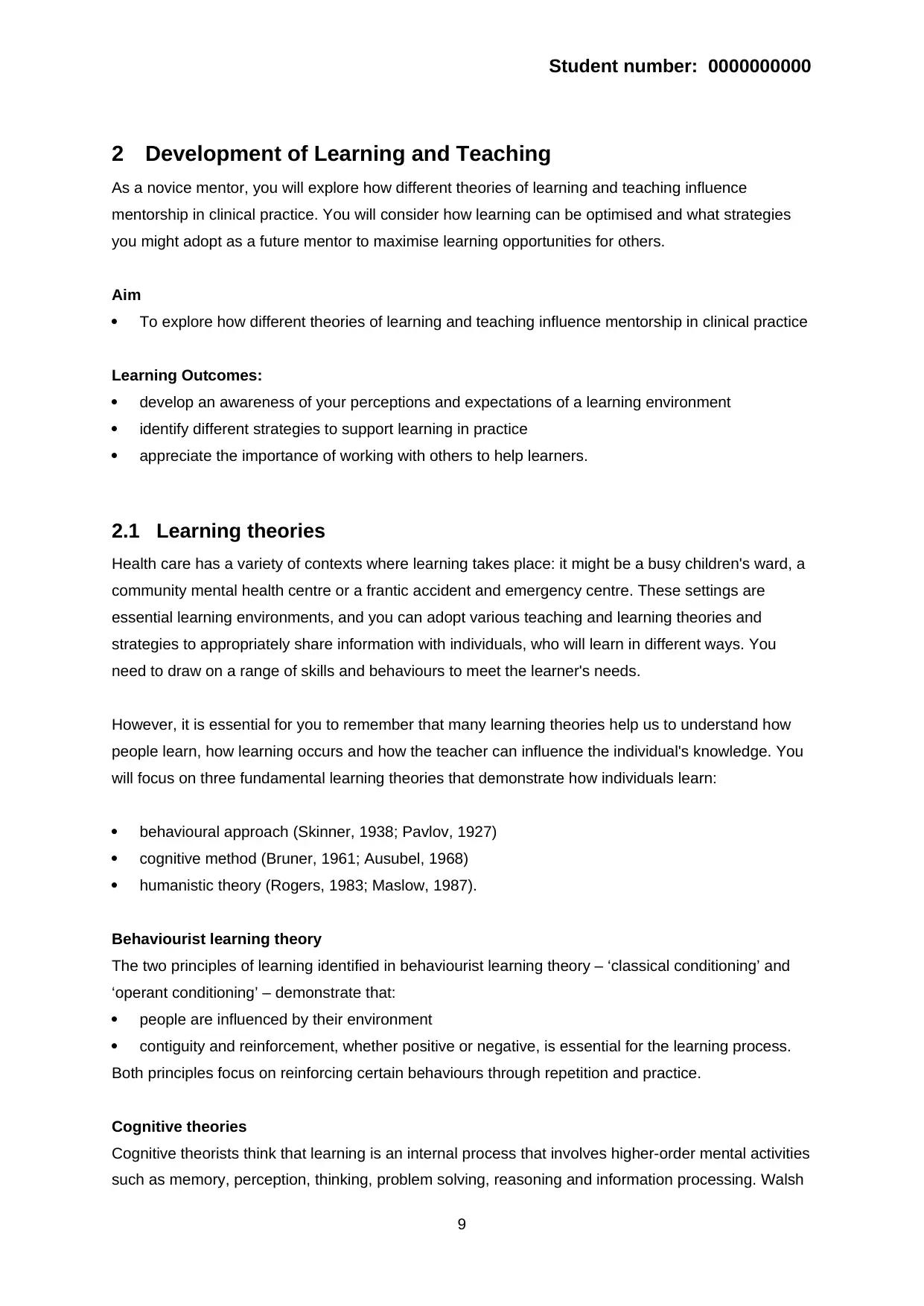
Student number: 0000000000
2 Development of Learning and Teaching
As a novice mentor, you will explore how different theories of learning and teaching influence
mentorship in clinical practice. You will consider how learning can be optimised and what strategies
you might adopt as a future mentor to maximise learning opportunities for others.
Aim
To explore how different theories of learning and teaching influence mentorship in clinical practice
Learning Outcomes:
develop an awareness of your perceptions and expectations of a learning environment
identify different strategies to support learning in practice
appreciate the importance of working with others to help learners.
2.1 Learning theories
Health care has a variety of contexts where learning takes place: it might be a busy children's ward, a
community mental health centre or a frantic accident and emergency centre. These settings are
essential learning environments, and you can adopt various teaching and learning theories and
strategies to appropriately share information with individuals, who will learn in different ways. You
need to draw on a range of skills and behaviours to meet the learner's needs.
However, it is essential for you to remember that many learning theories help us to understand how
people learn, how learning occurs and how the teacher can influence the individual's knowledge. You
will focus on three fundamental learning theories that demonstrate how individuals learn:
behavioural approach (Skinner, 1938; Pavlov, 1927)
cognitive method (Bruner, 1961; Ausubel, 1968)
humanistic theory (Rogers, 1983; Maslow, 1987).
Behaviourist learning theory
The two principles of learning identified in behaviourist learning theory – ‘classical conditioning’ and
‘operant conditioning’ – demonstrate that:
people are influenced by their environment
contiguity and reinforcement, whether positive or negative, is essential for the learning process.
Both principles focus on reinforcing certain behaviours through repetition and practice.
Cognitive theories
Cognitive theorists think that learning is an internal process that involves higher-order mental activities
such as memory, perception, thinking, problem solving, reasoning and information processing. Walsh
9
2 Development of Learning and Teaching
As a novice mentor, you will explore how different theories of learning and teaching influence
mentorship in clinical practice. You will consider how learning can be optimised and what strategies
you might adopt as a future mentor to maximise learning opportunities for others.
Aim
To explore how different theories of learning and teaching influence mentorship in clinical practice
Learning Outcomes:
develop an awareness of your perceptions and expectations of a learning environment
identify different strategies to support learning in practice
appreciate the importance of working with others to help learners.
2.1 Learning theories
Health care has a variety of contexts where learning takes place: it might be a busy children's ward, a
community mental health centre or a frantic accident and emergency centre. These settings are
essential learning environments, and you can adopt various teaching and learning theories and
strategies to appropriately share information with individuals, who will learn in different ways. You
need to draw on a range of skills and behaviours to meet the learner's needs.
However, it is essential for you to remember that many learning theories help us to understand how
people learn, how learning occurs and how the teacher can influence the individual's knowledge. You
will focus on three fundamental learning theories that demonstrate how individuals learn:
behavioural approach (Skinner, 1938; Pavlov, 1927)
cognitive method (Bruner, 1961; Ausubel, 1968)
humanistic theory (Rogers, 1983; Maslow, 1987).
Behaviourist learning theory
The two principles of learning identified in behaviourist learning theory – ‘classical conditioning’ and
‘operant conditioning’ – demonstrate that:
people are influenced by their environment
contiguity and reinforcement, whether positive or negative, is essential for the learning process.
Both principles focus on reinforcing certain behaviours through repetition and practice.
Cognitive theories
Cognitive theorists think that learning is an internal process that involves higher-order mental activities
such as memory, perception, thinking, problem solving, reasoning and information processing. Walsh
9
Paraphrase This Document
Need a fresh take? Get an instant paraphrase of this document with our AI Paraphraser
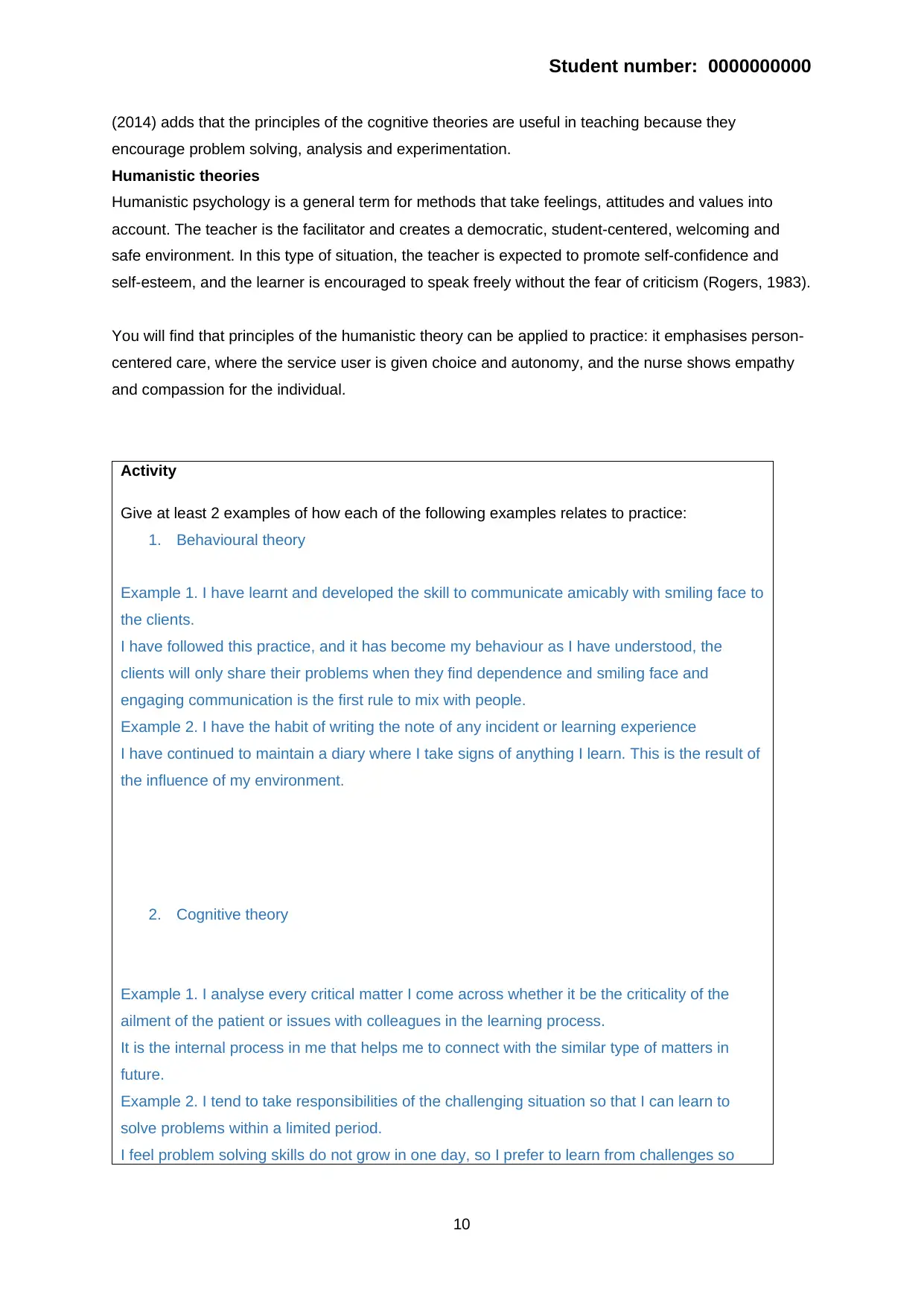
Student number: 0000000000
(2014) adds that the principles of the cognitive theories are useful in teaching because they
encourage problem solving, analysis and experimentation.
Humanistic theories
Humanistic psychology is a general term for methods that take feelings, attitudes and values into
account. The teacher is the facilitator and creates a democratic, student-centered, welcoming and
safe environment. In this type of situation, the teacher is expected to promote self-confidence and
self-esteem, and the learner is encouraged to speak freely without the fear of criticism (Rogers, 1983).
You will find that principles of the humanistic theory can be applied to practice: it emphasises person-
centered care, where the service user is given choice and autonomy, and the nurse shows empathy
and compassion for the individual.
Activity
Give at least 2 examples of how each of the following examples relates to practice:
1. Behavioural theory
Example 1. I have learnt and developed the skill to communicate amicably with smiling face to
the clients.
I have followed this practice, and it has become my behaviour as I have understood, the
clients will only share their problems when they find dependence and smiling face and
engaging communication is the first rule to mix with people.
Example 2. I have the habit of writing the note of any incident or learning experience
I have continued to maintain a diary where I take signs of anything I learn. This is the result of
the influence of my environment.
2. Cognitive theory
Example 1. I analyse every critical matter I come across whether it be the criticality of the
ailment of the patient or issues with colleagues in the learning process.
It is the internal process in me that helps me to connect with the similar type of matters in
future.
Example 2. I tend to take responsibilities of the challenging situation so that I can learn to
solve problems within a limited period.
I feel problem solving skills do not grow in one day, so I prefer to learn from challenges so
10
(2014) adds that the principles of the cognitive theories are useful in teaching because they
encourage problem solving, analysis and experimentation.
Humanistic theories
Humanistic psychology is a general term for methods that take feelings, attitudes and values into
account. The teacher is the facilitator and creates a democratic, student-centered, welcoming and
safe environment. In this type of situation, the teacher is expected to promote self-confidence and
self-esteem, and the learner is encouraged to speak freely without the fear of criticism (Rogers, 1983).
You will find that principles of the humanistic theory can be applied to practice: it emphasises person-
centered care, where the service user is given choice and autonomy, and the nurse shows empathy
and compassion for the individual.
Activity
Give at least 2 examples of how each of the following examples relates to practice:
1. Behavioural theory
Example 1. I have learnt and developed the skill to communicate amicably with smiling face to
the clients.
I have followed this practice, and it has become my behaviour as I have understood, the
clients will only share their problems when they find dependence and smiling face and
engaging communication is the first rule to mix with people.
Example 2. I have the habit of writing the note of any incident or learning experience
I have continued to maintain a diary where I take signs of anything I learn. This is the result of
the influence of my environment.
2. Cognitive theory
Example 1. I analyse every critical matter I come across whether it be the criticality of the
ailment of the patient or issues with colleagues in the learning process.
It is the internal process in me that helps me to connect with the similar type of matters in
future.
Example 2. I tend to take responsibilities of the challenging situation so that I can learn to
solve problems within a limited period.
I feel problem solving skills do not grow in one day, so I prefer to learn from challenges so
10
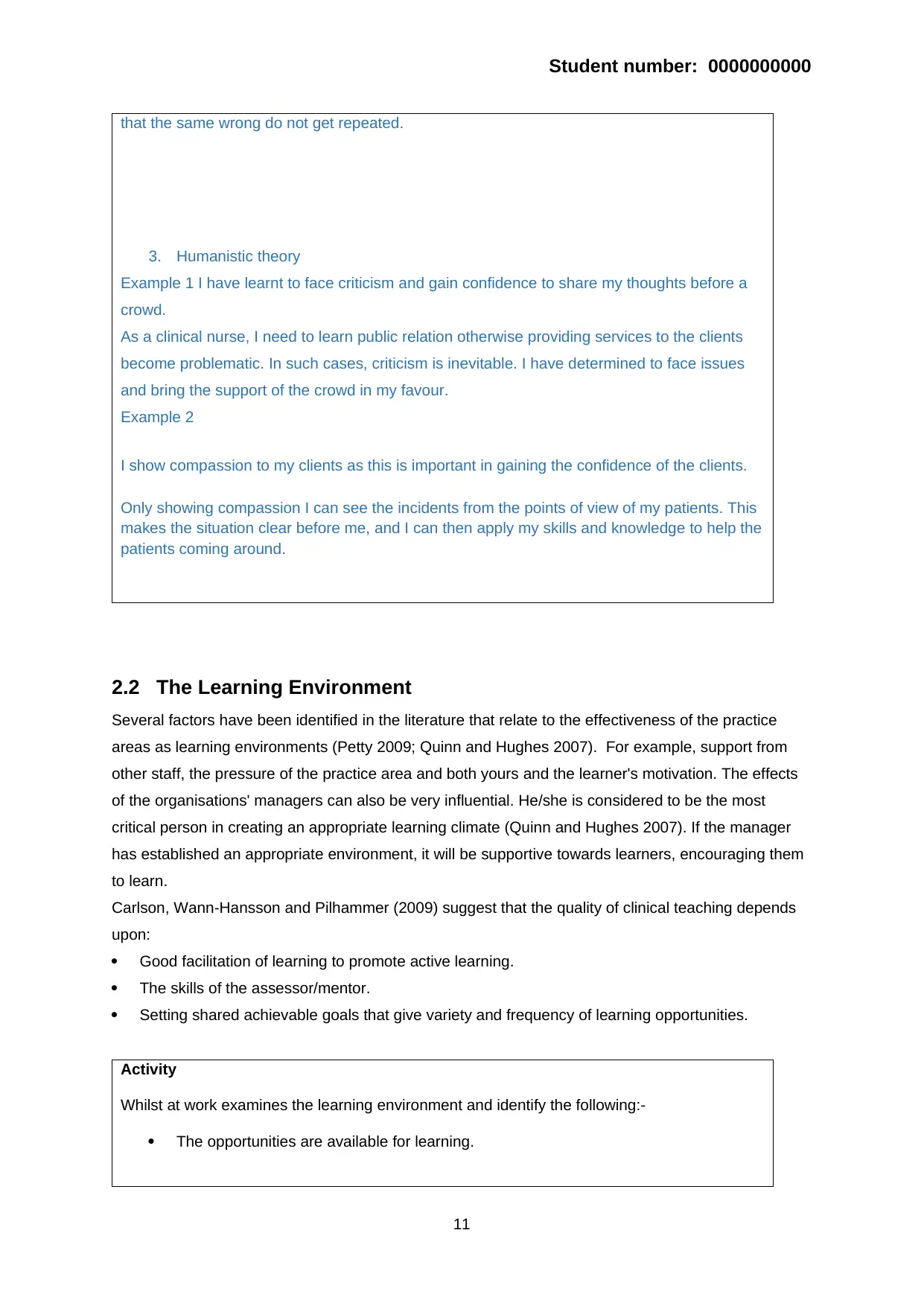
Student number: 0000000000
that the same wrong do not get repeated.
3. Humanistic theory
Example 1 I have learnt to face criticism and gain confidence to share my thoughts before a
crowd.
As a clinical nurse, I need to learn public relation otherwise providing services to the clients
become problematic. In such cases, criticism is inevitable. I have determined to face issues
and bring the support of the crowd in my favour.
Example 2
I show compassion to my clients as this is important in gaining the confidence of the clients.
Only showing compassion I can see the incidents from the points of view of my patients. This
makes the situation clear before me, and I can then apply my skills and knowledge to help the
patients coming around.
2.2 The Learning Environment
Several factors have been identified in the literature that relate to the effectiveness of the practice
areas as learning environments (Petty 2009; Quinn and Hughes 2007). For example, support from
other staff, the pressure of the practice area and both yours and the learner's motivation. The effects
of the organisations' managers can also be very influential. He/she is considered to be the most
critical person in creating an appropriate learning climate (Quinn and Hughes 2007). If the manager
has established an appropriate environment, it will be supportive towards learners, encouraging them
to learn.
Carlson, Wann-Hansson and Pilhammer (2009) suggest that the quality of clinical teaching depends
upon:
Good facilitation of learning to promote active learning.
The skills of the assessor/mentor.
Setting shared achievable goals that give variety and frequency of learning opportunities.
Activity
Whilst at work examines the learning environment and identify the following:-
The opportunities are available for learning.
11
that the same wrong do not get repeated.
3. Humanistic theory
Example 1 I have learnt to face criticism and gain confidence to share my thoughts before a
crowd.
As a clinical nurse, I need to learn public relation otherwise providing services to the clients
become problematic. In such cases, criticism is inevitable. I have determined to face issues
and bring the support of the crowd in my favour.
Example 2
I show compassion to my clients as this is important in gaining the confidence of the clients.
Only showing compassion I can see the incidents from the points of view of my patients. This
makes the situation clear before me, and I can then apply my skills and knowledge to help the
patients coming around.
2.2 The Learning Environment
Several factors have been identified in the literature that relate to the effectiveness of the practice
areas as learning environments (Petty 2009; Quinn and Hughes 2007). For example, support from
other staff, the pressure of the practice area and both yours and the learner's motivation. The effects
of the organisations' managers can also be very influential. He/she is considered to be the most
critical person in creating an appropriate learning climate (Quinn and Hughes 2007). If the manager
has established an appropriate environment, it will be supportive towards learners, encouraging them
to learn.
Carlson, Wann-Hansson and Pilhammer (2009) suggest that the quality of clinical teaching depends
upon:
Good facilitation of learning to promote active learning.
The skills of the assessor/mentor.
Setting shared achievable goals that give variety and frequency of learning opportunities.
Activity
Whilst at work examines the learning environment and identify the following:-
The opportunities are available for learning.
11
⊘ This is a preview!⊘
Do you want full access?
Subscribe today to unlock all pages.

Trusted by 1+ million students worldwide
1 out of 31
Related Documents
Your All-in-One AI-Powered Toolkit for Academic Success.
+13062052269
info@desklib.com
Available 24*7 on WhatsApp / Email
![[object Object]](/_next/static/media/star-bottom.7253800d.svg)
Unlock your academic potential
Copyright © 2020–2025 A2Z Services. All Rights Reserved. Developed and managed by ZUCOL.





